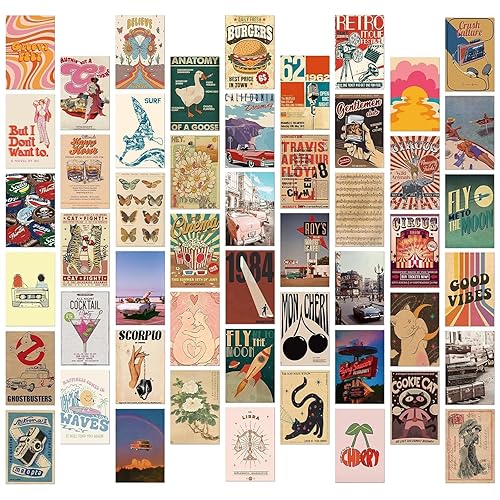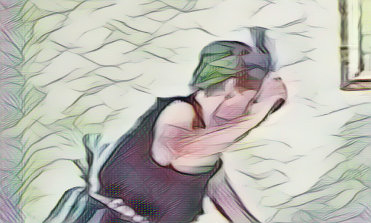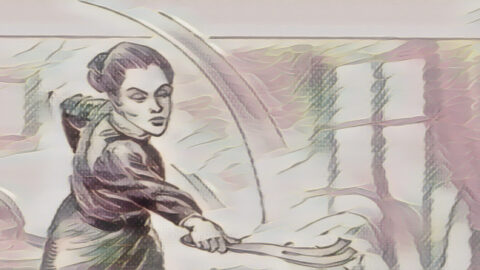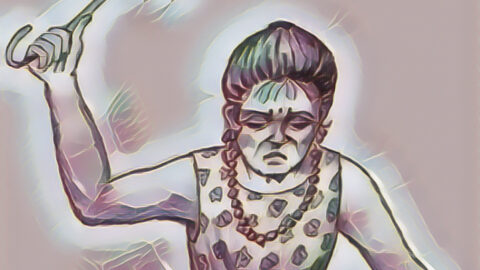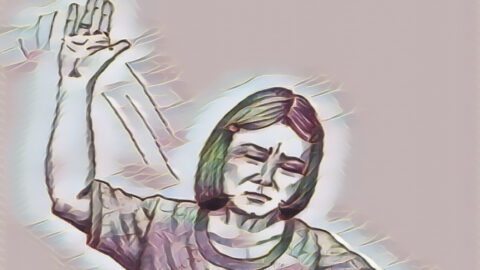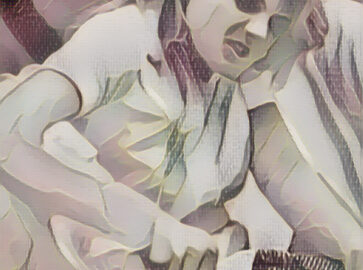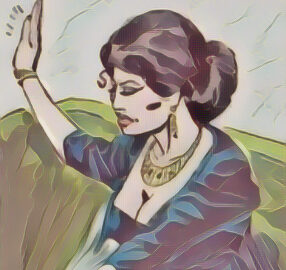(gap: 2s) Before I recount the events of that most memorable summer, allow me to introduce the principal figures in our tale, as one might be presented to a gathering of well-bred children on a bright morning in the 1950s. The sun shone through the windows, the aroma of freshly baked bread drifted from the kitchen, and the sound of laughter echoed through the house, promising a day of adventure.
(short pause) First, there is myself—Margaret. I was an energetic girl of eleven, with a head of untidy brown curls and a nose liberally sprinkled with freckles. My eyes were ever alight with mischief, and I was known for my quick wit and even quicker tongue. I delighted in adventure, though it sometimes led me into difficulties, particularly when my imagination ran away with me. My favourite occupation was climbing the old apple tree in our garden, where I would sit for hours, reading or devising my next plan.
(pause) My mother, Mrs. Thompson, was the very picture of brisk efficiency, always attired in neat skirts and immaculate blouses, her hair drawn back in a tidy bun. She possessed a gentle yet firm manner, and her eyes sparkled with kindness even when she was being strict. She believed in good manners, hearty meals, and the value of a summer well spent. I remember her bustling about the kitchen, humming softly as she prepared our meals, her hands deft and sure as she kneaded dough or polished the silver.
(short pause) Then there was Miss Susan, the head of the camp. Tall and graceful, with silver-streaked hair and a warm, steady gaze, she wore smart dresses and sensible shoes. Her voice was gentle but carried authority, and she had a remarkable ability to make every girl feel both safe and important. She was the sort of adult to whom one could confide a secret, but whom one would never dare to cross. I recall the way she would gather us around the great oak table in the evenings, her stories captivating us as the fire crackled in the grate.
(pause) Among the girls at camp, Mary was distinguished by her cleverness. She was tall and slender, with neat plaits and spectacles perched on her nose. Mary was always to be found with a book in hand and could recite poetry at a moment’s notice. She was thoughtful and kind, and the rest of us often sought her advice. I remember one rainy afternoon when she patiently assisted me with my sums, her voice calm and encouraging as the rain pattered against the windowpanes.
(short pause) Jane was the most daring—short and sturdy, with a shock of red hair and a perpetual grin. She could climb any tree in the county and was always the first to suggest a bold adventure. Jane’s laughter was infectious, and though she often found herself in trouble, she accepted her punishments with good grace and a twinkle in her eye. She once challenged us all to race to the top of the hill behind the camp, and we tumbled down together, breathless and giggling, our knees grass-stained and our spirits high.
(pause) Anne, the jolliest of us all, had rosy cheeks and bouncing golden curls. She was always ready with a joke or a funny story, and her laughter could brighten even the dreariest day. Anne was a loyal friend, quick to comfort anyone who felt homesick or sad. I can still hear her singing cheerful songs as we washed the dishes, her voice lifting our spirits and making even the dullest chores seem enjoyable.
(short pause) There was also Miss Nora, the camp’s cook and helper. Plump and cheerful, with flour always dusting her apron, she made the finest scones in the world and had a laugh that rumbled like distant thunder. She believed every problem could be solved with a warm embrace and a plate of biscuits. The kitchen was her domain, and she ruled it with a wooden spoon and a heart full of affection.
(pause) With these splendid characters assembled, our story may properly commence.
(short pause) It was the summer of 1958, and I, Margaret, was anticipating a most delightful holiday from school. The days stretched ahead, full of promise—picnics by the river, games in the meadow, and long afternoons spent reading in the shade of the old oak tree. However, Mother had other intentions. She informed me, with a twinkle in her eye, that I would be spending my summer with the Girl Guides at a special camp for girls who required a little extra guidance. I must confess, I was rather displeased at first, for I had not attended Guides since my birthday, and I had hoped for a summer of picnics and games with my friends.
(short pause) Despite my protests, Mother was resolute yet loving. “It will do you good, Margaret,” she said, patting my shoulder. I remember the journey to Seaview, the countryside rolling past in a blur of green fields and wildflowers, the salty tang of the sea growing stronger as we neared the coast. We sang songs to pass the time, and Mother pointed out the little cottages and grazing sheep along the way. At last, we arrived at a cheerful little house by the sea in a town called Seaview, its whitewashed walls gleaming in the sunlight and its garden bursting with hollyhocks and daisies.
(pause) Upon our arrival, a tall, kindly lady named Miss Susan greeted us at the door. She wore a smart dress and had a gentle smile, but I could tell she was a person of authority. Her handshake was firm, and her eyes seemed to see straight through to one’s very soul. She welcomed us inside, and I caught my first glimpse of the spacious, airy common room, with its polished wooden floors and shelves lined with books and board games.
(short pause) Mother explained that the camp had been recommended by my school, as I had been rather too spirited of late. The intention was to help me become a well-mannered young lady before I commenced at my new school in September. I listened, fidgeting with the hem of my dress, my mind already wandering to the adventures that might await.
(pause) The camp lasted the entire summer, and Mother and Father had saved diligently to send me. There were eight girls in all, and we slept in neat bunk beds in a bright, airy room. Each bed had a patchwork quilt and a little shelf for our treasures—books, photographs, and the occasional secret sweet tucked away for midnight feasts. The first night, we whispered stories to each other by torchlight, the room filled with the soft rustle of sheets and the occasional giggle.
(short pause) Each week, we alternated between “heart work”—writing letters, reading stories, and learning poems—and “body work”—hiking, camping, and assisting with chores. Meals were simple but delicious, and we all took turns helping in the kitchen. I remember the smell of fresh bread in the mornings, and the way Miss Nora would allow us to lick the spoon after making jam. The days were busy, but there was always time for a game of rounders or a swim in the sea.
(pause) Miss Susan explained the rules kindly but firmly. “If you break a rule, you may have to write lines or forgo a treat. For more serious mischief, you may receive a firm smack with the slipper, just as your mothers would give you at home. It is always done with love, to help you remember to do better next time.” She showed us the slipper—a soft, well-worn thing, more symbolic than frightening—and assured us that it was never used in anger, but always as a lesson in self-improvement.
(short pause) I was a little apprehensive, but Miss Susan’s gentle manner made me feel safe. I whispered to Mother that I might attempt to run away, but she only smiled and said, “You will have a wonderful time, Margaret. Be brave and do your best.” She embraced me tightly before leaving, her perfume lingering in the air long after the car had disappeared down the lane.
(pause) The other girls were all a little older than I. There was Mary, who was exceedingly clever; Jane, who could climb any tree; and Anne, who was always making us laugh. I felt somewhat out of place at first, but soon we became fast friends. On the first evening, we sat in a circle on the grass, sharing stories about our homes and families, the sky above us turning pink and gold as the sun set over the sea.
(short pause) On the very first day, Jane attempted to sneak out to the sweet shop. She tiptoed down the hallway, her shoes in her hand, but was discovered by Miss Susan, who brought her back inside. We watched from the staircase, holding our breath as Jane was gently reprimanded. She returned a few minutes later, rubbing her bottom and smiling sheepishly. “Just a little reminder,” she said, “nothing to worry about!” We all burst out laughing, the tension broken, and Jane became something of a heroine for her daring.
(pause) I was curious, as my own school only used the slipper for the most serious offences. But here, everything was conducted kindly, and no one was ever truly cross for long. Even after a punishment, there was always a kind word or a comforting pat on the shoulder.
(short pause) The camp was strict, but always fair. We knew the rules, and if we broke them, we accepted our gentle punishments with good grace. There were no tricks or surprises—just an opportunity to learn and grow. I remember one afternoon when Anne accidentally broke a teacup. She confessed at once, and Miss Susan praised her honesty before giving her a gentle task to make amends.
(pause) My first lesson came the following day. We were in the classroom, and Mr. John, who taught us history, asked us to write an essay about good behaviour. I grumbled and refused, and Miss Susan was summoned. The other girls watched with wide eyes as I was led from the room, my heart pounding in my chest.
(short pause) “Margaret, would you please come with me?” she asked. I followed her to her office, feeling rather nervous. The room was cosy, with a large desk, a vase of wildflowers, and a window overlooking the garden.
(pause) The air in the office felt thick with anticipation, and my hands trembled as I stood before Miss Susan’s desk. She closed the door gently behind us, her face kind but serious. I could hear the faint sounds of the other girls in the hallway, their whispers muffled by the thick wooden door. My heart thudded in my chest, and I felt a curious mixture of dread and curiosity—what would it truly be like, this “gentle reminder” with the slipper?
(short pause) Miss Susan sat down and patted the edge of her desk, inviting me to stand beside her. “Now, Margaret, bend over the table, please. This is a firm reminder to help you remember to be your best self.” Her voice was calm and reassuring, and I felt a little braver, though my cheeks burned with embarrassment. The sunlight streamed through the window, casting warm golden patterns on the floor, and I focused on those shifting shapes to steady my nerves.
(pause) “Oh, must I?” I asked, my voice barely more than a whisper. My hands fidgeted with the hem of my dress, and I could feel my lower lip trembling. Miss Susan only smiled kindly, her eyes full of understanding. She placed a comforting hand on my shoulder, and I knew she meant no harm. There was a pause—a moment that seemed to stretch on forever—before I finally nodded and did as I was told.
(short pause) I bent over the desk, my heart fluttering like a trapped bird. I could hear the distant sound of the sea through the open window, mingling with the soft rustle of papers on the desk. Miss Susan picked up the slipper—a soft, well-worn thing, its leather faded from years of gentle use. She spoke softly, “It is for your own good, my dear. Just a firm tap, and then it is all over.” Her words were gentle, but I could sense the importance behind them.
(pause) I squeezed my eyes shut, bracing myself. The first tap landed—a sharp, stinging sensation that made me gasp. The second followed, more forceful, causing a hot, burning pain that brought tears to my eyes. It was over in a moment, but the sensation lingered—a harsh, throbbing reminder that I had crossed a line, but was still cared for. Tears streamed down my cheeks, not just from the pain, but from the rush of emotion: embarrassment, relief, and a newfound resolve to do better.








